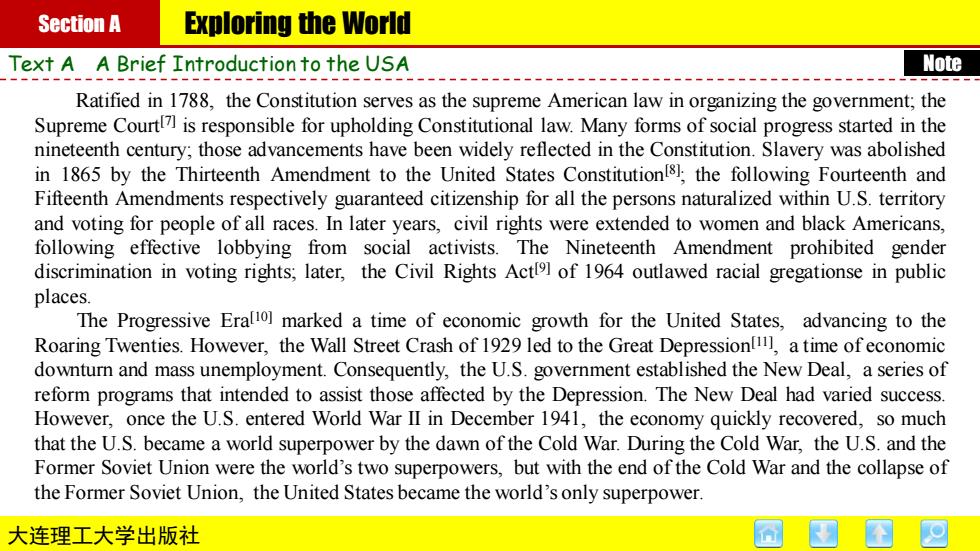正在加载图片...

Section A Exploring the World Text AA Brief Introduction to the USA Note Ratified in 1788,the Constitution serves as the supreme American law in organizing the government;the Supreme Courtl7 is responsible for upholding Constitutional law.Many forms of social progress started in the nineteenth century;those advancements have been widely reflected in the Constitution.Slavery was abolished in 1865 by the Thirteenth Amendment to the United States Constitution8];the following Fourteenth and Fifteenth Amendments respectively guaranteed citizenship for all the persons naturalized within U.S.territory and voting for people of all races.In later years,civil rights were extended to women and black Americans, following effective lobbying from social activists.The Nineteenth Amendment prohibited gender discrimination in voting rights;later,the Civil Rights Actl9 of 1964 outlawed racial gregationse in public places. The Progressive Eraliol marked a time of economic growth for the United States,advancing to the Roaring Twenties.However,the Wall Street Crash of 1929 led to the Great Depressionll,a time of economic downturn and mass unemployment.Consequently,the U.S.government established the New Deal,a series of reform programs that intended to assist those affected by the Depression.The New Deal had varied success. However,once the U.S.entered World War II in December 1941,the economy quickly recovered,so much that the U.S.became a world superpower by the dawn of the Cold War.During the Cold War,the U.S.and the Former Soviet Union were the world's two superpowers,but with the end of the Cold War and the collapse of the Former Soviet Union,the United States became the world's only superpower. 大连理工大学出版社大连理工大学出版社 Section A Exploring the World Text A A Brief Introduction to the USA Ratified in 1788, the Constitution serves as the supreme American law in organizing the government; the Supreme Court[7] is responsible for upholding Constitutional law. Many forms of social progress started in the nineteenth century; those advancements have been widely reflected in the Constitution. Slavery was abolished in 1865 by the Thirteenth Amendment to the United States Constitution[8] ; the following Fourteenth and Fifteenth Amendments respectively guaranteed citizenship for all the persons naturalized within U.S. territory and voting for people of all races. In later years, civil rights were extended to women and black Americans, following effective lobbying from social activists. The Nineteenth Amendment prohibited gender discrimination in voting rights; later, the Civil Rights Act[9] of 1964 outlawed racial gregationse in public places. The Progressive Era[10] marked a time of economic growth for the United States, advancing to the Roaring Twenties. However, the Wall Street Crash of 1929 led to the Great Depression[11] , a time of economic downturn and mass unemployment. Consequently, the U.S. government established the New Deal, a series of reform programs that intended to assist those affected by the Depression. The New Deal had varied success. However, once the U.S. entered World War II in December 1941, the economy quickly recovered, so much that the U.S. became a world superpower by the dawn of the Cold War. During the Cold War, the U.S. and the Former Soviet Union were the world’s two superpowers, but with the end of the Cold War and the collapse of the Former Soviet Union, the United States became the world’s only superpower. Note